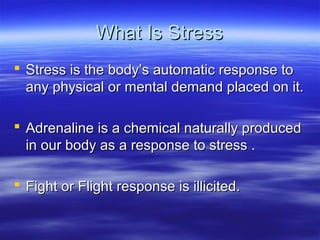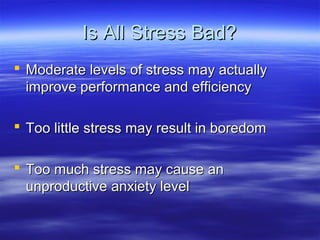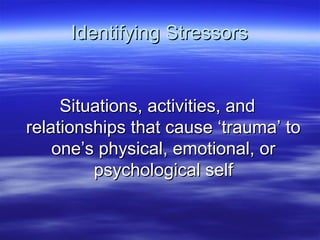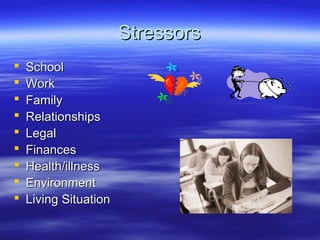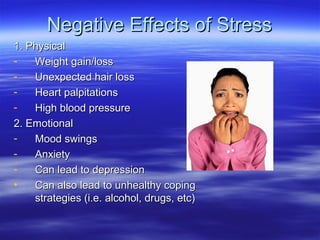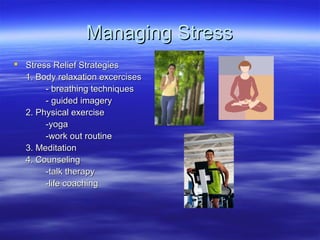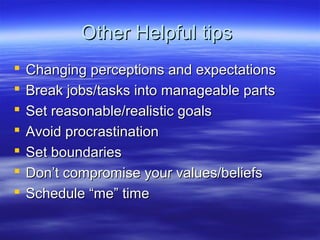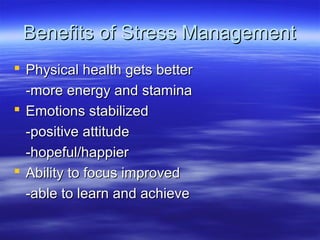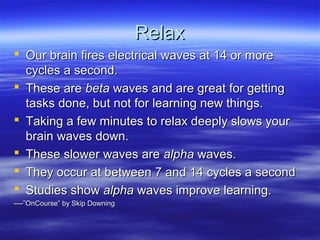Stress management
- 2. What Is StressWhat Is Stress ï§ Stress is the bodyâs automatic response toStress is the bodyâs automatic response to any physical or mental demand placed on it.any physical or mental demand placed on it. ï§ Adrenaline is a chemical naturally producedAdrenaline is a chemical naturally produced in our body as a response to stress .in our body as a response to stress . ï§ Fight or Flight response is illicited.Fight or Flight response is illicited.
- 3. Is All Stress Bad?Is All Stress Bad? ï§ Moderate levels of stress may actuallyModerate levels of stress may actually improve performance and efficiencyimprove performance and efficiency ï§ Too little stress may result in boredomToo little stress may result in boredom ï§ Too much stress may cause anToo much stress may cause an unproductive anxiety levelunproductive anxiety level
- 4. Identifying StressorsIdentifying Stressors Situations, activities, andSituations, activities, and relationships that cause âtraumaâ torelationships that cause âtraumaâ to oneâs physical, emotional, oroneâs physical, emotional, or psychological selfpsychological self
- 5. StressorsStressors ï§ SchoolSchool ï§ WorkWork ï§ FamilyFamily ï§ RelationshipsRelationships ï§ LegalLegal ï§ FinancesFinances ï§ Health/illnessHealth/illness ï§ EnvironmentEnvironment ï§ Living SituationLiving Situation
- 6. Negative Effects of StressNegative Effects of Stress 1. Physical1. Physical - Weight gain/lossWeight gain/loss - Unexpected hair lossUnexpected hair loss - Heart palpitationsHeart palpitations - High blood pressureHigh blood pressure 2. Emotional2. Emotional - Mood swingsMood swings - AnxietyAnxiety - Can lead to depressionCan lead to depression âĒ Can also lead to unhealthy copingCan also lead to unhealthy coping strategies (i.e. alcohol, drugs, etc)strategies (i.e. alcohol, drugs, etc)
- 7. Managing StressManaging Stress ï§ Stress Relief StrategiesStress Relief Strategies 1. Body relaxation excercises1. Body relaxation excercises - breathing techniques- breathing techniques - guided imagery- guided imagery 2. Physical exercise2. Physical exercise -yoga-yoga -work out routine-work out routine 3. Meditation3. Meditation 4. Counseling4. Counseling -talk therapy-talk therapy -life coaching-life coaching
- 8. Other Helpful tipsOther Helpful tips ï§ Changing perceptions and expectationsChanging perceptions and expectations ï§ Break jobs/tasks into manageable partsBreak jobs/tasks into manageable parts ï§ Set reasonable/realistic goalsSet reasonable/realistic goals ï§ Avoid procrastinationAvoid procrastination ï§ Set boundariesSet boundaries ï§ Donât compromise your values/beliefsDonât compromise your values/beliefs ï§ Schedule âmeâ timeSchedule âmeâ time
- 9. Benefits of Stress ManagementBenefits of Stress Management ï§ Physical health gets betterPhysical health gets better -more energy and stamina-more energy and stamina ï§ Emotions stabilizedEmotions stabilized -positive attitude-positive attitude -hopeful/happier-hopeful/happier ï§ Ability to focus improvedAbility to focus improved -able to learn and achieve-able to learn and achieve
- 10. RelaxRelax ï§ Our brain fires electrical waves at 14 or moreOur brain fires electrical waves at 14 or more cycles a second.cycles a second. ï§ These areThese are betabeta waves and are great for gettingwaves and are great for getting tasks done, but not for learning new things.tasks done, but not for learning new things. ï§ Taking a few minutes to relax deeply slows yourTaking a few minutes to relax deeply slows your brain waves down.brain waves down. ï§ These slower waves areThese slower waves are alphaalpha waves.waves. ï§ They occur at between 7 and 14 cycles a secondThey occur at between 7 and 14 cycles a second ï§ Studies showStudies show alphaalpha waves improve learning.waves improve learning. ----âOnCourseâ by Skip Downing----âOnCourseâ by Skip Downing
- 11. The Key Word IsâĶ.The Key Word IsâĶ. BalanceBalance


